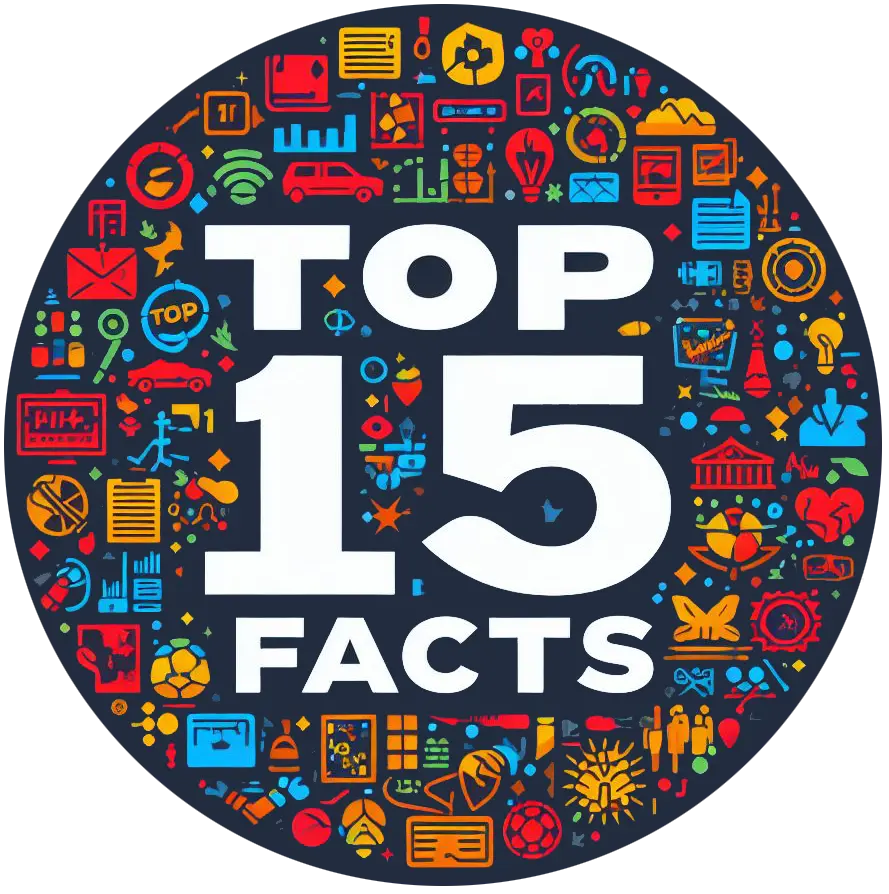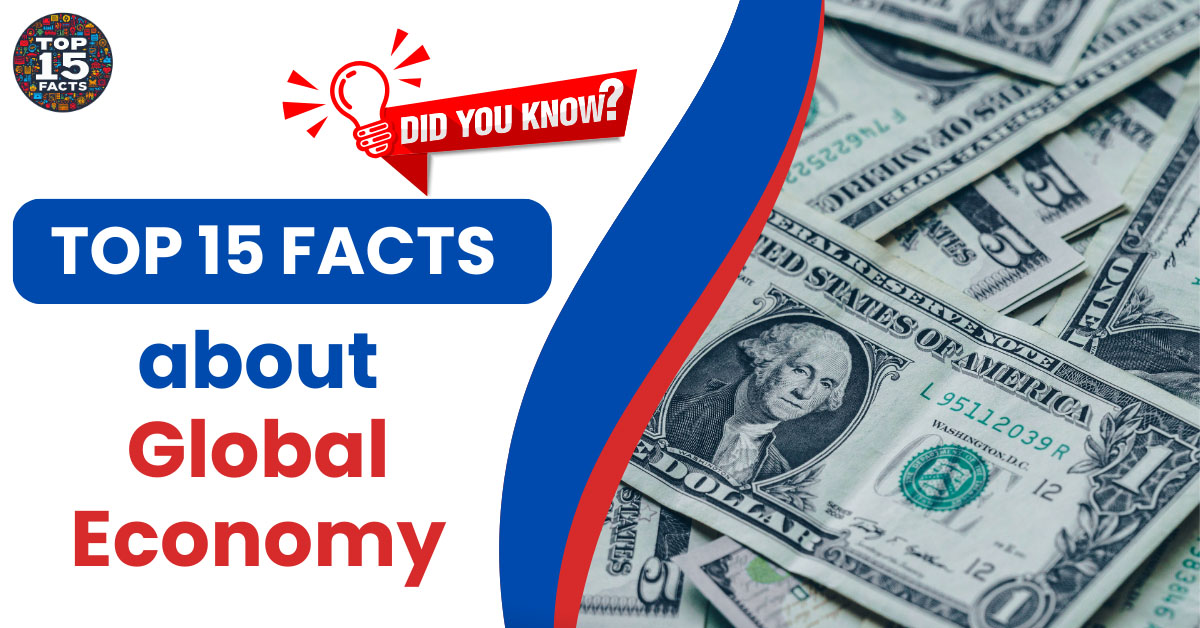Introduction
The global economy is a complex and ever-evolving beast. It’s a web of interconnected markets, industries, and policies that shape our daily lives in ways we often don’t even realize. From the price of your morning coffee to the job market, what happens on the global economic stage has a ripple effect. Let’s dive into some truly surprising facts that will challenge your perceptions of how the world’s money flows.
Top 15 Surprising Facts About the Global Economy(One Line facts)
- The world’s total wealth is an unfathomable $544 trillion.
- The top 1% of the world’s population owns more wealth than the bottom 99% combined.
- There are more mobile phones in the world than there are toilets.
- McDonald’s is one of the largest distributors of toys in the world.
- The informal economy makes up a significant portion of many countries’ GDP.
- China is expected to surpass the US as the world’s largest economy within the decade.
- Global debt has reached record highs, exceeding $300 trillion.
- Counterfeit goods make up trillions of dollars of the global economy.
- The richest person in the world has more wealth than some small countries.
- Tax havens hold an estimated $32 trillion in untaxed wealth.
- The cost of a Big Mac can indicate the strength of a country’s currency.
- Women’s unpaid labor contributes trillions of dollars to the global economy.
- Climate change is projected to cause trillions of dollars in economic damage.
- Automation threatens to displace millions of jobs worldwide.
- The global economy has experienced more ups and downs in recent decades than in the past.
Fact 1: The world’s total wealth is an unfathomable $544 trillion.
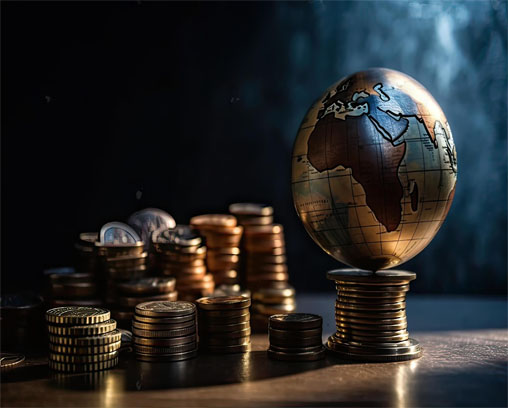
This staggering number is difficult to comprehend. To put it in perspective, if you divided that wealth equally among the global population, each person would receive roughly $70,000. However, wealth distribution around the world is far from equal, leading to the next surprising fact.
Read More: 15 Mind-Blowing Facts About Robert Downey Jr. You Didn’t Know
Fact 2: The top 1% of the world’s population owns more wealth than the bottom 99% combined.
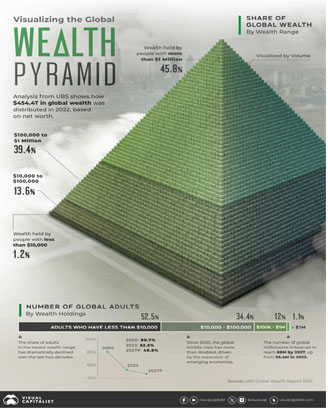
Image Source: visualcapitalist
This extreme wealth inequality highlights the vast disparities within the global economy. This concentration of wealth in the hands of a few has significant implications for economic stability, social justice, and political power.
If you want to read more about this Fact Click on this Link Global Wealth Distribution
Fact 3: There are more mobile phones in the world than there are toilets.

This fact underscores the uneven distribution of essential resources worldwide. While mobile phone technology has advanced rapidly, billions of people still lack access to basic sanitation facilities. This demonstrates a disparity in access to essential needs and how technological advancement isn’t always aligned with addressing fundamental human development issues.
Fact 4: McDonald’s is one of the largest distributors of toys in the world.

This might seem like a quirky fact, but it highlights the reach of multinational corporations and their influence on consumer spending. McDonald’s distributes billions of toys annually with its Happy Meals, making it a driving force in the global toy industry. This taps into the complex dynamics of globalization, branding, and childhood marketing.
If you want to read more about this Fact Click on this Link Happy Meal toys
Fact 5: The informal economy makes up a significant portion of many countries’ GDP.

The informal economy refers to economic activities outside of regulations and taxation. This includes everything from street vendors to unlicensed businesses and under-the-table work. While often associated with developing countries, the informal economy plays a role in many nations, revealing how economic activity doesn’t always fit within standard measurements of GDP.
Read More: Exploring the Shadows: Top 15 Facts About Taylor Swift That May Surprise You
Fact 6: China is expected to surpass the US as the world’s largest economy within the decade.
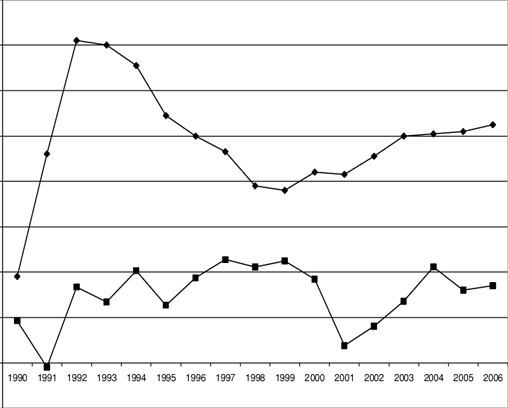
The 2007 World Factbook (Washington, DC: GPO).
This projected shift marks a significant change in global economic power. China’s rapid economic growth has been fueled by manufacturing and exports, and its rise signifies a new era in global economic leadership. This will likely have implications for trade, technology, and global geopolitics.
Fact 7: Global debt has reached record highs, exceeding $300 trillion.
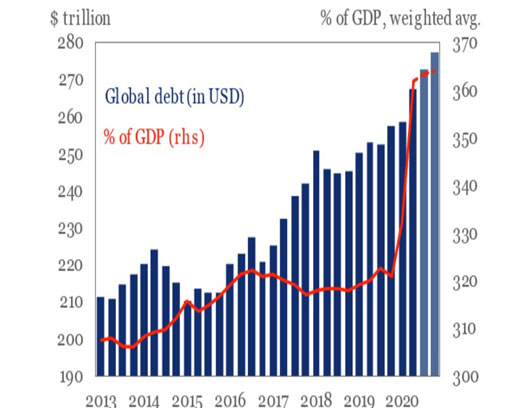
Soaring debt levels, both public and private, raise concerns about financial stability. High debt can restrict a country’s ability to invest in infrastructure, education, and social programs. It can also lead to higher interest rates making borrowing more expensive. Understanding the magnitude of global debt is essential to grasp potential economic risks.
If you want to read more about this Fact Click on this Link global debt soars to a new all-time high
Fact 8: Counterfeit goods make up trillions of dollars of the global economy.
The trade in counterfeit goods is a vast and lucrative underground market. Fake products, ranging from luxury items to pharmaceuticals, undermine legitimate businesses, damage brand reputations, and can pose safety risks to consumers. This illicit sector highlights the challenges of intellectual property protection and supply chain oversight in a globalized world.
Fact 9: The richest person in the world has more wealth than some small countries.
This extreme concentration of wealth in the hands of a single individual is a stark illustration of global wealth inequality. It puts into perspective the vast difference between individual fortunes and the means of entire nations and poses questions about the nature of economic systems that allow for such vast accumulations of wealth.
Fact 10: Climate change is projected to cause trillions of dollars in economic damage.

Climate change is no longer just an environmental issue; it’s an economic one. Rising sea levels, extreme weather events, and crop failures due to climate change are projected to cause massive disruptions, infrastructure damage, and lost productivity. The economic costs of climate change underscore the urgency of climate action and investment in sustainable practices.
If you want to read more about this Fact Click on this Link Climate Change Worsens Heatwaves
Fact 11: Automation threatens to displace millions of jobs worldwide.
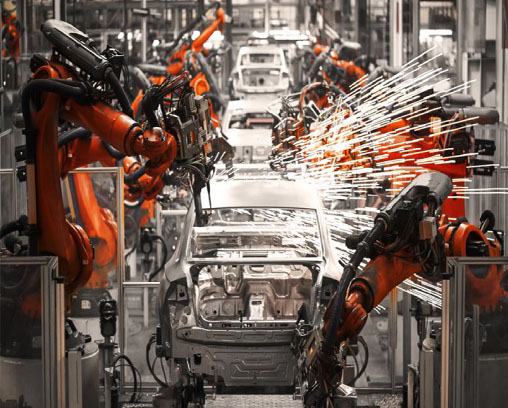
As artificial intelligence and robotics advance, there are concerns about widespread job displacement across industries. While automation can improve efficiency, it also poses a challenge to employment and income security for many workers. Understanding the potential impact of automation on the job market is crucial for policymakers and businesses as they prepare for the future of work.
Fact 12: The global economy has experienced more ups and downs in recent decades than in the past.
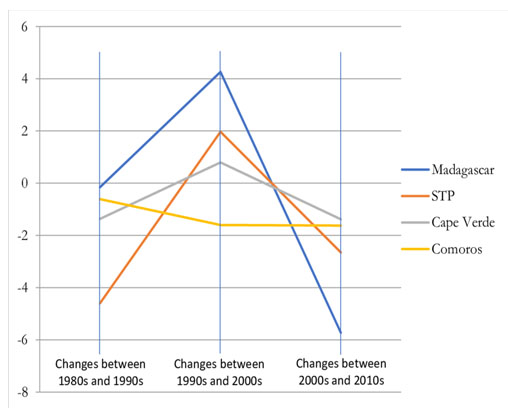
Image Source: researchgate
The global economy has become more volatile, with periods of rapid growth followed by recessions or crises. This volatility can be attributed to factors such as increased interconnectedness, financial deregulation, and the rise of emerging markets. The volatility of the modern economy reinforces the need for resilient economic policies and international collaboration.
Fact 13: Tax havens hold an estimated $32 trillion in untaxed wealth.
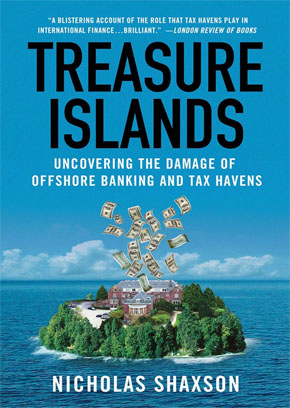
Image Source: amazon
The vast amount of wealth hidden in tax havens deprives governments worldwide of billions in tax revenue. This lost revenue could be used to fund vital public services such as education, healthcare, and infrastructure. Combating tax evasion and ensuring fair taxation is a global challenge with far-reaching economic implications.
Fact 14: The cost of a Big Mac can indicate the strength of a country’s currency.

The Big Mac Index is an informal economic tool that compares the price of a Big Mac in different countries after adjusting for exchange rates. This can offer a rough estimate of whether currencies are overvalued or undervalued, providing insights into economic disparities between countries.
Fact 15: Women’s unpaid labor contributes trillions of dollars to the global economy.
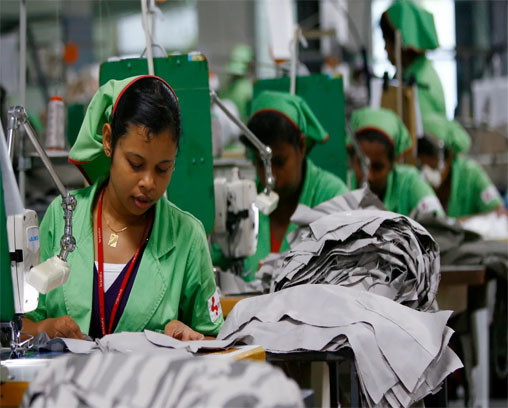
Women’s unpaid labor, such as housework, childcare, and caring for the elderly, is essential to the functioning of households and societies. While this work is often unacknowledged and undervalued, it represents a vast economic contribution. Recognizing and quantifying women’s unpaid labor is crucial for promoting gender equality and fairer economic policies.
Conclusion
The global economy is a dynamic and surprising web of wealth, inequality, and innovation. Understanding these surprising aspects challenges our assumptions and offers new perspectives on global development, technology, and social justice. By engaging with these complexities, we can take steps to shape a more equitable and sustainable economic future.
15 Most Asked Questions (FAQs)
-
How does wealth inequality impact the global economy?
Extreme wealth inequality can stifle economic growth, lead to social unrest, hinder innovation, and undermine political stability. When a vast amount of wealth is concentrated in the hands of a few, it reduces consumer spending by the majority of the population, which can slow down economic growth. Additionally, inequality can lead to social tensions and political instability, disrupting economic activity.
-
What role does technology play in shaping the global economy?
Technology is a double-edged sword in the global economy. It can drive innovation, increase productivity, and create new markets. However, it can also exacerbate inequality, disrupt traditional industries, and lead to job displacement. To harness the benefits of technology while mitigating its negative impacts, policymakers need to address education, skill development, and social safety nets.
-
What are some major challenges facing the global economy currently?
The global economy faces numerous challenges, including rising debt levels, climate change, automation, geopolitical tensions, and persistent inequality. These challenges are interconnected and require global cooperation and innovative solutions to ensure sustainable and equitable economic growth.
-
How do tax havens impact the global economy?
Tax havens, countries with low or zero tax rates and high levels of secrecy, enable wealthy individuals and corporations to avoid paying taxes in their home countries. This deprives governments of billions of dollars in revenue, which could be used to fund essential public services like education, healthcare, and infrastructure. Tax havens also exacerbate inequality and undermine the fairness of the global tax system.
-
What is the Big Mac Index and what does it tell us?
The Big Mac Index is an informal economic indicator created by The Economist magazine. It compares the price of a Big Mac in different countries after adjusting for exchange rates. While not a perfect measure, it offers a rough estimate of whether currencies are overvalued or undervalued, providing insights into economic disparities between countries.
-
How is women’s unpaid labor factored into the global economy?
Women’s unpaid labor, such as housework, childcare, and eldercare, represents a massive yet largely uncounted contribution to the global economy. Studies estimate that if women’s unpaid work was assigned a monetary value, it would add trillions of dollars to the global GDP. Recognizing and quantifying women’s unpaid labor is crucial for promoting gender equality and fairer economic policies.
-
What are the consequences of extreme wealth inequality?
Extreme wealth inequality has numerous negative consequences. It can exacerbate social and political tensions, stifle economic growth by reducing overall demand, and lead to a concentration of power that undermines democratic institutions. Addressing wealth inequality is essential for creating more just and sustainable economies.
-
What is the role of international organizations like the World Bank and the IMF in the global economy?
The World Bank and the International Monetary Fund (IMF) play significant roles in the global economy. They provide loans and financial assistance to countries, especially developing nations, support economic stability, and promote international economic cooperation. However, their policies and actions have also been subject to criticism, especially regarding their impact on poorer nations.
-
How does globalization impact jobs and wages?
Globalization has a mixed impact on jobs and wages. While it can create new jobs and opportunities in some sectors and countries, it can also lead to job losses in others, particularly in industries facing competition from abroad. Globalization can also put downward pressure on wages in some sectors, while lifting wages in others. The net impact depends on a country’s economic structure, policies, and position in global trade networks.
-
What are the impacts of climate change on the global economy?
Climate change has far-reaching economic impacts. Extreme weather events, such as floods and droughts, can destroy infrastructure, disrupt supply chains, and damage crops. Rising sea levels threaten coastal cities and industries. The economic costs of inaction on climate change far outweigh the investments needed to transition to a sustainable future.
-
What are the risks and benefits of automation for the economy?
Automation has the potential to increase productivity, efficiency, and drive innovation. However, it also poses risks of job displacement, especially for workers in routine or repetitive tasks. The key challenge lies in managing the transition to an automated economy by investing in education, re-skilling workers, and creating social safety nets to mitigate the negative impacts.
-
Why is the global economy more volatile now than in the past?
The increased volatility of the global economy stems from various factors. Globalization has made economies more interconnected, so economic shocks in one country can quickly have ripple effects across the globe. Financial deregulation has led to greater risk-taking and potential for instability. Additionally, the rise of emerging markets has reshaped the global economic landscape, contributing to fluctuations.
-
How does the informal economy impact economic development?
The informal economy plays a complex role in economic development. On the one hand, it provides a source of income and livelihood for millions of people who might otherwise be unemployed. On the other hand, it can hinder economic growth by making it difficult for governments to collect taxes and enforce regulations. The informal economy also lacks the protections and benefits of formal employment.
-
What are the potential consequences of rising global debt?
High levels of global debt pose several risks to the economy. Rising debt can lead to higher interest rates, making it more expensive for businesses and governments to borrow money. It can also limit the ability of governments to invest in important areas like infrastructure, education, and healthcare, and make them more vulnerable to financial crises. In extreme cases, unsustainable debt can lead to defaults and economic instability.
-
How does the global trade of counterfeit goods impact legitimate businesses?
The counterfeit trade has significant negative consequences for legitimate businesses. Fake products undermine sales and damage brand reputation. Companies also may need to invest heavily in anti-counterfeit measures and face legal costs associated with protecting their intellectual property. Counterfeit goods can also pose safety and quality risks to consumers.
